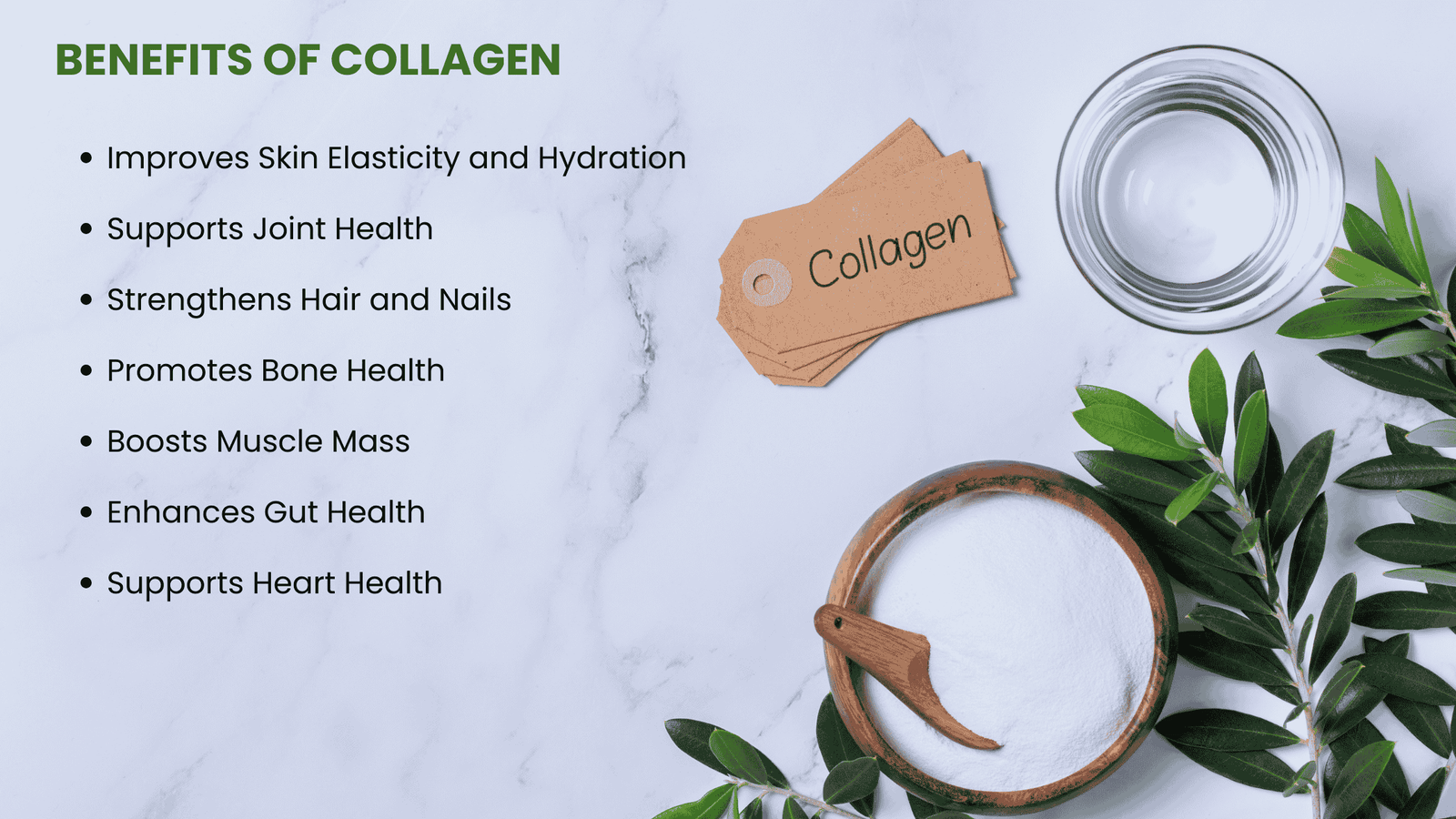Collagen is the most abundant protein in the human body and plays a vital role in maintaining the health and structure of our skin, hair, nails, joints, and connective tissues. Often referred to as the “building block” of the body, collagen provides strength and elasticity, keeping our skin firm, our joints flexible, and our overall body resilient. However, as we age, the natural production of collagen declines, leading to visible signs of aging, joint discomfort, and other health concerns.
In recent years, collagen supplements have surged in popularity within the health and wellness community. From powders and capsules to collagen-infused drinks and collagen peptide supplements, people are increasingly turning to these products to replenish their body’s collagen levels. Backed by scientific research and glowing testimonials, collagen has become a go-to solution for those seeking improved skin health, enhanced mobility, and overall well-being.
This article explores the top seven benefits of taking collagen and why it deserves a place in your daily routine. Whether you’re looking to achieve glowing skin, reduce joint pain, or strengthen your hair and nails, collagen could be the missing piece in your health journey. Read on to discover how collagen supplements can support your body from the inside out and help you feel your best at any age.
What is Collagen?
Collagen is a crucial protein that acts as the structural foundation for your body. It makes up about 30% of the total protein in the human body and is found in connective tissues, skin, hair, nails, muscles, and bones. Essentially, collagen acts as a glue, holding everything together and providing strength, elasticity, and firmness. Without collagen, our bodies would lose their structural integrity, leading to weaker joints, sagging skin, and other health challenges.
Naturally produced by the body, collagen is created by combining specific amino acids derived from the food we eat. However, as we age, collagen production begins to slow down, typically starting in our mid-to-late twenties. By the time we reach our forties, collagen levels have declined significantly, which may result in visible signs of aging such as wrinkles, fine lines, and reduced skin elasticity. Decreasing collagen levels can also lead to weaker joints, brittle nails, and thinner hair.
This natural decline in collagen production is further impacted by external factors like sun exposure, pollution, smoking, poor diet, and stress. These elements can accelerate collagen breakdown, making it even more important to find ways to support and replenish collagen levels. Collagen-rich foods provide essential amino acids, vitamins, and minerals that assist in the body’s collagen synthesis.
This is where collagen supplements come in. Typically made from animal or marine sources, collagen supplements are hydrolyzed into peptides, making them easy for the body to absorb and utilize. They work by providing the body with the necessary building blocks to stimulate collagen production and repair damaged tissues. Available in various forms such as powders, capsules, and beverages, collagen supplements have gained immense popularity for their ability to promote skin hydration, reduce signs of aging, improve joint health, and enhance overall vitality.
Incorporating collagen supplements into your routine can be a proactive way to combat the natural decline of collagen production and support your body’s health. Whether your goal is to maintain youthful skin, strengthen your joints, or boost hair and nail health, collagen is a key player in keeping your body strong and vibrant.
The Science Behind Collagen Supplements
Collagen supplements have gained popularity in recent years due to their potential benefits for skin health, joint pain, and bone density. But what is the science behind these supplements? Collagen is a protein that is naturally produced by the body, and it plays a crucial role in maintaining the structure and strength of connective tissues such as skin, bones, and joints.
Collagen supplements typically contain hydrolyzed collagen, which is broken down into smaller peptides that can be easily absorbed by the body. These peptides are then used to stimulate collagen production, which can help to improve skin elasticity, hydration, and texture.
Research has shown that collagen supplementation can increase collagen production in the body, which can lead to improvements in skin health and joint pain. One study found that oral collagen peptide supplementation increased collagen production in the skin, leading to improved skin elasticity and hydration. Another study found that collagen supplementation reduced joint pain and improved joint function in individuals with osteoarthritis.
The benefits of collagen supplements are not limited to skin and joint health. Collagen is also an important component of muscle tissue, and research has shown that collagen supplementation can help to increase muscle mass and strength. Additionally, collagen supplements may help to improve bone density, which can reduce the risk of osteoporosis and fractures.
Benefits of collagen

1. Improves Skin Elasticity and Hydration
Collagen plays a vital role in maintaining the health and appearance of your skin. It is a key structural protein found in the dermis, the middle layer of the skin, responsible for its elasticity, firmness, and hydration. As we age, the body’s natural collagen production slows down, leading to the formation of wrinkles, fine lines, and dryness, which are common signs of skin aging.
Taking collagen supplements can help counteract this natural decline. Collagen peptides provide the skin with essential amino acids, which support the rebuilding of collagen fibers and stimulate the body’s natural collagen production. This process helps to restore skin elasticity, making it firmer and more resilient, while reducing the appearance of wrinkles over time.
Collagen is also known to improve skin hydration. By enhancing the skin’s moisture retention capabilities, it helps to combat dryness and create a smoother, more radiant complexion. Studies have shown that individuals who take collagen supplements regularly experience noticeable improvements in skin hydration and texture, significantly increasing skin moisture levels.
In addition to its anti-aging benefits, collagen supports the overall health of your skin by improving its protective barrier. This makes your skin better equipped to handle environmental stressors such as pollution and UV rays, which can accelerate aging. By incorporating collagen into your routine, you can enjoy more youthful, glowing, and hydrated skin. It’s a simple yet effective step toward achieving long-term skin health and radiance.
2. Supports Joint Health
Collagen is a fundamental component of cartilage, the flexible tissue that cushions and supports joints. As we age, natural collagen levels in the body decline, leading to a gradual breakdown of cartilage. This deterioration can result in joint pain, stiffness, and decreased mobility, commonly associated with conditions like osteoarthritis.
Supplementing with collagen can be highly beneficial for joint health. Most collagen supplements are derived from animal products and provide the body with essential amino acids that help repair and maintain cartilage integrity. This can reduce joint discomfort, enhance flexibility, and promote smoother movement. Research has shown that individuals who take collagen supplements regularly often experience a significant decrease in joint pain and an improvement in overall joint function.
Collagen’s anti-inflammatory properties also play a role in soothing joint pain. It helps reduce inflammation within the joints, minimizing swelling and discomfort. Athletes and active individuals, in particular, find collagen beneficial for supporting joint recovery after intense physical activities.
Whether you are dealing with age-related joint issues or seeking to maintain joint health proactively, incorporating collagen into your daily routine can make a noticeable difference. It offers a natural way to support your joints, enhance mobility, and maintain an active, pain-free lifestyle.
3. Strengthens Hair and Nails
Collagen plays a vital role in maintaining the strength and structure of hair and nails. As a protein rich in amino acids, collagen provides the building blocks needed for healthy growth and repair. When collagen levels in the body are adequate, it helps prevent brittle nails and weak, thinning hair.
For nails, collagen improves keratin production, which is the primary protein that forms their structure. This leads to stronger, less brittle nails that are less prone to breaking or splitting. Many people who take collagen supplements report faster nail growth and improved nail health over time.
Collagen also contributes to healthy hair growth by supporting the hair follicles and improving the strength of the hair strands. It enhances the scalp’s dermal layer, which is critical for providing nutrients and maintaining healthy hair. By strengthening the hair from the root, collagen helps reduce hair breakage and promotes thicker, shinier locks.
Age and environmental factors, such as stress and exposure to pollutants, can lead to collagen depletion, making hair and nails more vulnerable to damage. Incorporating collagen supplements into your routine provides your body with the resources it needs to rebuild and maintain strong, healthy hair and nails, offering a natural solution for achieving a polished, vibrant look.
4. Promotes Bone Health
Collagen plays a critical role in maintaining strong and healthy bones. As the primary protein in bones, collagen provides them with structure, flexibility, and strength. It acts as a framework upon which minerals like calcium are deposited, ensuring that bones remain dense and resilient.
As we age, natural collagen production decreases, which can lead to reduced bone density and a higher risk of conditions like osteoporosis. Incorporating collagen supplements into your routine can help combat this decline by providing your body with the essential amino acids needed to support bone regeneration and maintenance.
Studies suggest that collagen supplementation can help increase bone mineral density and slow the rate of bone loss, making it a beneficial addition for individuals concerned about bone health. This is particularly important for postmenopausal women and older adults who are more prone to fractures and bone-related issues.
By strengthening the internal structure of bones, collagen promotes overall skeletal health and supports an active lifestyle. Whether you’re aiming to prevent bone loss or enhance recovery from an injury, collagen can be a natural and effective way to protect your bones and maintain mobility as you age.
5. Boosts Muscle Mass
Collagen is essential for supporting muscle repair, growth, and overall strength. As a key protein in the body, it forms part of the connective tissue in muscles, providing structure and aiding in their functionality. Collagen contains glycine and proline, amino acids that are vital for muscle regeneration and recovery.
Regular collagen supplementation can help improve muscle mass, especially in individuals with age-related muscle loss, a condition known as sarcopenia. Studies suggest that combining collagen with resistance training can enhance muscle strength and promote the development of lean muscle. By supporting muscle fibers and connective tissues, collagen also helps reduce the risk of injuries during physical activity.
Additionally, collagen can improve post-workout recovery by reducing inflammation and supporting tissue repair, making it a popular choice among athletes and fitness enthusiasts. For anyone looking to maintain or increase muscle mass, incorporating collagen into their routine can be an effective and natural way to achieve those goals while ensuring long-term muscular health.
6. Enhances Gut Health
Collagen plays a vital role in supporting gut health by strengthening the lining of the digestive tract. The gut lining acts as a barrier, preventing harmful substances from entering the bloodstream while allowing essential nutrients to be absorbed. Collagen contains amino acids like glycine and glutamine, which are known to promote the repair and integrity of this lining.
For individuals with digestive issues such as leaky gut syndrome or irritable bowel syndrome (IBS), collagen can be particularly beneficial. It helps soothe inflammation in the gut and aids in healing damaged tissues, improving overall digestion and nutrient absorption.
Additionally, collagen supports the production of stomach acid, which is essential for breaking down food and preventing bloating or discomfort. Regular collagen supplementation can help maintain a healthy gut environment, reduce digestive distress, and promote overall gastrointestinal well-being. Whether added to meals, beverages, or taken as a supplement, collagen is a natural way to enhance digestive health and improve gut function.
7. Supports Heart Health
Collagen plays an essential role in maintaining a healthy cardiovascular system by contributing to the strength and elasticity of arteries. Arteries, which carry blood from the heart to the rest of the body, require structural support to function effectively. Collagen provides this support, helping to keep arteries strong and flexible, reducing the risk of stiffness and narrowing.
When collagen levels in the body decrease with age, arteries may weaken, increasing the risk of cardiovascular conditions such as atherosclerosis, which can lead to heart attacks or strokes. By supplementing with collagen, you can help maintain the integrity of arterial walls and promote better blood flow throughout the body.
Moreover, collagen contains amino acids like proline, which aid in repairing damaged tissue, and glycine, which helps reduce inflammation and regulate blood pressure. Together, these properties make collagen a valuable addition to a heart-healthy lifestyle. Incorporating collagen into your routine—whether through powders, supplements, or natural sources—can be a proactive step toward supporting long-term cardiovascular health.
How to Take Collagen
-
Choose Your Preferred Form: Collagen is available in various forms such as powders, drinks, and capsules. Oral collagen supplements come as pills and powders, and studies have shown they can improve skin hydration, elasticity, and reduce wrinkles. Powders are versatile and can be mixed into smoothies, coffee, or soups, while drinks and capsules are convenient for on-the-go use.
-
Start with the Recommended Daily Intake: Most experts suggest 10-20 grams of collagen per day, depending on your health goals. Always follow the dosage instructions on the product label.
-
Consume Collagen at the Right Time: For optimal absorption, take collagen in the morning on an empty stomach or at night before bed when your body’s natural repair processes are most active.
-
Pair with Vitamin C: Enhance collagen production by combining your supplement with foods or drinks rich in vitamin C, such as orange juice or a fruit smoothie.
-
Be Consistent: Regular consumption is key to seeing results. Incorporate collagen into your daily routine for long-term benefits.
-
Stay Hydrated: Drinking plenty of water helps collagen work effectively in the body, promoting better skin and joint health.
-
Experiment with Recipes: Mix collagen powder into baked goods, salad dressings, or oatmeal for a creative way to include it in your diet.
Safety and Efficacy of Collagen Supplements
Collagen supplements are generally considered safe and well-tolerated. However, as with any supplement, there are potential side effects and interactions to be aware of. Some individuals may experience digestive issues, such as bloating or gas, after taking collagen supplements. Additionally, collagen supplements may interact with certain medications, such as blood thinners.
The efficacy of collagen supplements is supported by a growing body of research. Studies have consistently shown that collagen supplementation can improve skin health, joint pain, and bone density. However, more research is needed to fully understand the benefits and potential risks of collagen supplements.
When choosing a collagen supplement, it is important to look for products that are made from high-quality, hydrolyzed collagen. Additionally, consider products that are rich in amino acids, such as glycine, proline, and hydroxyproline, which are important for collagen production. Vitamin C is also an important nutrient for collagen production, so look for products that contain this vitamin.
In conclusion, collagen supplements are a promising tool for improving skin health, joint pain, and bone density. While more research is needed to fully understand the benefits and potential risks of collagen supplements, the existing evidence suggests that they are safe and effective. As with any supplement, it is important to talk to a healthcare professional before starting collagen supplementation.
Additional Tips for Choosing Quality Collagen
-
Select Sustainably Sourced Collagen: Opt for collagen products derived from grass-fed, pasture-raised animals or wild-caught fish. This ensures a cleaner, more sustainable source with fewer additives and contaminants.
-
Understand the Types of Collagen:
-
Type I: Best for skin, hair, nails, and bones. It’s the most abundant collagen in the body and ideal for enhancing overall beauty and bone health.
-
Type II: Supports joint health and cartilage repair, making it ideal for those with joint pain or arthritis.
-
Type III: Found in the skin, muscles, and blood vessels, this type complements Type I for improved skin elasticity and muscle repair.
-
-
Check for Clean Ingredients: Look for products with minimal ingredients and avoid those with artificial fillers, preservatives, or added sugars.
-
Choose Hydrolyzed Collagen: Also known as collagen peptides, this form is broken down for easier absorption by the body, ensuring you get the maximum benefits.
-
Verify Purity and Testing: Opt for collagen brands that provide third-party testing to ensure safety, quality, and purity.
-
Consider Allergies and Dietary Restrictions: If you have dietary restrictions, look for labels indicating gluten-free, non-GMO, or pescatarian-friendly options.
-
Read Reviews: Check customer reviews and feedback to identify reputable brands that deliver real results.
Foods that support Collagen production in the body
Animal Based
Beef Bone Broth : Beef bone broth is rich in bovine collagen, particularly type I collagen, which is the most abundant type in the body. It is made by simmering bones and connective tissues, extracting collagen and nutrients.
Fish : Marine collagen is primarily found in the skin and bones of fish. Sardines are an excellent choice as they are often consumed whole, providing a good source of collagen.
Chicken (with Skin) : Chicken, especially when cooked with the skin on, contains significant amounts of type II collagen. Chicken skin and cartilage are particularly rich in this protein.
Pork Skin : Pork skin is another source of collagen and is commonly used in dishes like chicharrones. It provides a good amount of collagen when consumed.
Organ Meats (Offal) : Organ meats such as liver, kidneys, and heart contain high levels of collagen. While not universally popular, they are nutrient-dense options.
Egg Whites: Egg whites are high in proline, an amino acid that is crucial for collagen production. Including egg whites in your diet can help support your body’s collagen synthesis.
Jellyfish : Though less common in Western diets, jellyfish is a low-fat source of collagen that contains a variety of micronutrients.
Plant Based
Citrus Fruits : Citrus fruits like oranges, grapefruits, and lemons are high in vitamin C, which is essential for collagen synthesis. Vitamin C helps stabilize collagen molecules and promotes the formation of collagen fibers.
Berries : Berries such as strawberries, blueberries, and blackberries are rich in antioxidants and vitamin C. They help protect collagen from oxidative stress and support its production in the body.
Leafy Greens : Dark leafy greens like spinach, kale, and broccoli are packed with vitamins A and C, along with antioxidants that help protect existing collagen and promote new collagen synthesis.
Beans and Legumes : Beans, including chickpeas, black beans, and lentils, provide essential amino acids necessary for collagen production. They are also rich in zinc, which plays a crucial role in collagen synthesis.
Nuts and Seeds ; Nuts (like cashews) and seeds (such as pumpkin seeds) are high in zinc and copper, both of which are important for collagen production and maintaining skin elasticity.
Garlic : Garlic contains sulfur compounds that help prevent the breakdown of collagen while promoting its synthesis. Including garlic in your diet can enhance your body’s ability to produce collagen.
Soy Products : Soy foods like tofu and tempeh contain isoflavones that may help increase collagen levels in the skin by inhibiting enzymes that break down collagen.
Incorporating these foods into your diet can help support your body’s natural collagen production, contributing to healthier skin, joints, and overall well-being.
Conclusion
Collagen plays a vital role in maintaining overall health and wellness, offering benefits that range from improving skin elasticity and hydration to supporting joint health, strong bones, and a healthy heart. It’s an essential protein that not only enhances beauty by strengthening hair and nails but also supports muscle mass, gut health, and digestion.
As natural collagen production decreases with age, incorporating collagen supplements into your daily routine can make a significant difference. With various forms available, such as powders, capsules, and drinks, adding collagen is convenient and simple.
If you’re looking to improve your health from the inside out, now is the perfect time to try collagen supplements. Explore high-quality, sustainably sourced options to experience the transformative benefits of collagen and unlock your body’s potential for better wellness today!




